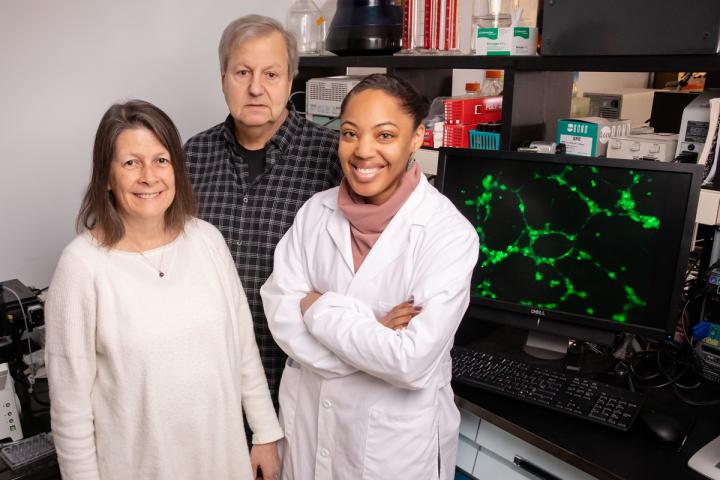
Credit: Photo by L. Brian Stauffer
CHAMPAIGN, Ill. — A new study in mice suggests that consuming the chemical compounds found in thermally abused cooking oil may trigger genetic changes that promote the progression of late-stage breast cancer.
Thermally abused frying oil – cooking oil that has been repeatedly reheated to high temperatures – may act as a toxicological trigger that promotes tumor cell proliferation, metastases and changes in lipid metabolism, scientists at the University of Illinois found. They reported their findings in the journal Cancer Prevention Research.
After consuming a low-fat diet for one week, one group of the mice was fed unheated fresh soybean oil, while another group consumed thermally abused oil for the next 16 weeks. Soybean oil was used in the study because of its common use by the food service industry in deep frying.
The U. of I. scientists simulated late-stage breast cancer by injecting 4T1 breast cancer cells into a tibia of each mouse. The 4T1 cells are an aggressive form of the disease that can spontaneously metastasize to multiple distant sites in the body, including the lungs, liver and lymph nodes, according to the study.
Twenty days after inoculation with the tumor cells, the primary tumors in the tibias of the mice that consumed the thermally abused oil had more than four times as much metastatic growth as the mice that consumed the fresh soybean oil. And when the researchers examined the animals’ lungs, they found more metastases among those that consumed the thermally abused oil.
“There were twice as many tumors in the lung, and they were more aggressive and invasive,” said William G. Helferich, a professor of food science and human nutrition, who led the research.
Food chemistry professor Nicki J. Engeseth, the acting head of the department, co-wrote the paper. Graduate student Ashley W. Oyirifi and U. of I. alumnus Anthony Cam were the lead authors.
“I just assumed these nodules in the lungs were little clones – but they weren’t. They’d undergone transformation to become more aggressive. The metastases in the fresh-oil group were there, but they weren’t as invasive or aggressive, and the proliferation wasn’t as extensive,” Helferich said.
In examining both groups of mice, the scientists found that the metastatic lung tumors in those that consumed thermally abused frying oil expressed significantly more of a key protein, Ki-67, which is associated strictly with cell proliferation.
Gene expression in these animals’ livers was altered as well. When the researchers conducted RNA sequencing analysis, they found 455 genes in which expression was at least two times greater – or, conversely, two times lower – than in mice that consumed the fresh oil.
The altered gene pathways were associated with oxidative stress and the metabolism of foreign substances, Oyirifi said.
When oil is repeatedly reused, triglycerides are broken apart, oxidizing free fatty acids and releasing acrolein, a toxic chemical that has carcinogenic properties.
Scientists have long known that thermally abused oil contains acrolein, and studies have linked the lipid peroxides in it with a variety of health problems, including atherosclerosis and heart disease.
As the oil degrades, polymer molecules also accumulate, raising nutritional and toxicological concerns, Engeseth said.
Countries in Europe and elsewhere regulate the amount of polar materials in frying oil, which are chemically altered triglycerides and fatty acids that are used as chemical markers of oils’ decomposition. Typically, these standards permit restaurants to use oil containing up to 24-27 percent polar material.
By contrast, the thermally abused oil used in the current study contained about 15 percent polar material, while fresh oil contains 2-4 percent or less, Helferich said.
“Because there are no regulations in the U.S., it’s really difficult for us to evaluate what’s out there,” Engeseth said. “But the important thing is, the food that’s fried in these oils sucks up quite a bit of oil. Even though we’re not consuming the oil directly, we’re consuming oil that’s brought into the food during the frying process.”
Breast cancer survivors’ biggest fear is recurrence, and the majority of these survivors have dormant tumor cells circulating in their blood, Helferich said.
“What wakes those cells up is anybody’s guess, but I’m convinced that diet activates them and creates an environment in different tissues that’s more fertile for them to grow,” he said.
“Many cancer biologists are trying to understand what’s happening at metastatic sites to prime them for tumor growth,” Oyirifi said. “We’re trying to add to this conversation and help people understand that it might not be just some inherent biological mechanism but a lifestyle factor. If diet provides an opportunity to reduce breast cancer survivors’ risk, it offers them agency over their own health.”
###
Additional co-authors on the study were Urszula T. Iwaniec and Russell T. Turner, both of Oregon State University; and Fureya (Yunxian) Liu, a then-graduate student at the U. of I.
The National Center for Complementary and Integrative Health, the Office of Dietary Supplements, the National Cancer Institute and the National Institute of Environmental Health Sciences funded the research.
Media Contact
Sharita Forrest
[email protected]
Original Source
https:/
Related Journal Article
http://dx.




